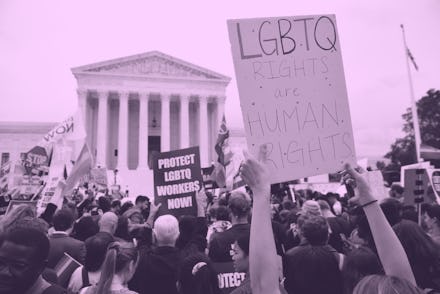The Supreme Court will decide if discrimination against LGBTQ+ people counts as free speech
A new case out of Colorado argues that declaring that your business won’t serve same-sex couples is protected speech.

Many of us remember the Supreme Court taking on the infamous wedding bakery case. Now, yet another Coloradan is looking to the court to protect their right to be, well, a bigot. In this case, the Supreme Court will consider a free speech claim from a Colorado web designer, who says it goes against her religious beliefs to build wedding websites to LGBTQ+ couples.
On Tuesday, the Supreme Court announced it would take up the case of Lorie Smith. Per AP News, Smith, a Denver-area designer, wants to expand her graphic and website design business to include wedding website services. However, she wants to post a statement on her site saying she’ll decline any requests from LGBTQ+ couples, citing Christianity as her excuse.
But doing so would put Smith in violation of Colorado’s anti-discrimination law. Now, she’s claiming that this law violates her freedom of speech because she wants to write the no-LGBTQ+ policy in a statement on her site. Time reported that Smith’s attorney, Kristen Waggoner, said, “Colorado has weaponized its law to silence speech it disagrees with, to compel speech it approves of, and to punish anyone who dares to dissent.”
On its surface, this sounds like a ridiculous case. And to some degree, it is.
Unfortunately, though, the current Supreme Court isn’t really a friend of the LGBTQ+ community, given that it’s overwhelmingly conservative. In that previous Colorado case, an even more liberal Supreme Court actually ruled in the baker’s favor in 2018 — and that baker was also represented by Waggoner.
Per CNN, the court said the Colorado Civil Rights Commission “showed hostility” to baker Jack Phillips due to his religious beliefs. At the time, Steve Vladeck, CNN Supreme Court analyst and professor at the University of Texas School of Law, said that the decision is “remarkably narrow, and leaves for another day virtually all of the major constitutional questions that this case presented.”
But with Smith’s case, these questions are being taken up once again — and it’s possible that the Supreme Court may offer a decision that sets a dangerous new precedent. For now, Colorado Attorney General Phil Weiser told Time, “Companies cannot turn away LGBT customers just because of who they are. We will vigorously defend Colorado’s laws, which protect all Coloradans by preventing discrimination and upholding free speech.”